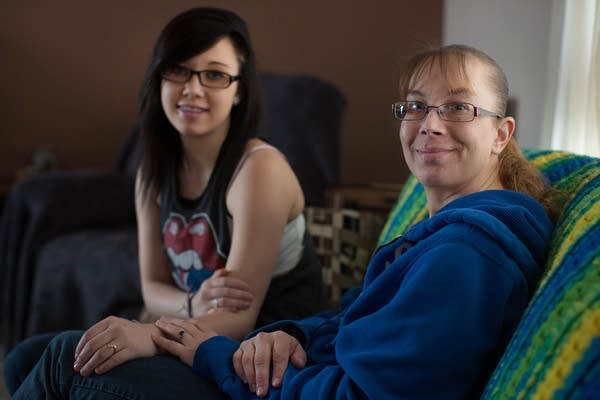Growing evidence that patients need an affordable, stable home to be healthy

Go Deeper.
Create an account or log in to save stories.
Like this?
Thanks for liking this story! We have added it to a list of your favorite stories.
Vanessa Smith doesn't work and because her primary income is $15,000 a year in government disability payments, she struggles to afford housing for herself and her 16-year-old daughter.
That's forced Smith to move every couple of years.
But Smith, who has bipolar disorder and a condition that causes nerve pain, doesn't want to move. The frequent upheavals take their toll.
"I don't like having to just have to get up and pack up and move somewhere else," she said. "I don't do good. I get extremely stressed, and I do get upset."
Turn Up Your Support
MPR News helps you turn down the noise and build shared understanding. Turn up your support for this public resource and keep trusted journalism accessible to all.
Health care companies are increasingly focused on patients like Smith, whose housing difficulties can compromise their health. Indeed, a growing body of research indicates a strong link between health and housing. If patients' rent is too high, they might avoid spending money on medications to treat diabetes and other diseases. Frequent moves also can lead to or deepen mental health problems.
"Studies show that without stable homes people are sick more often," said Kate Rubin, vice president of social responsibility for UnitedHealth Group. "There's more undiagnosed illness and people are more likely to seek care in emergency rooms."
Those illnesses are costly to insurers.
UnitedHealth is taking a rare step to address housing problems by spending $150 million to help build low-income homes in 12 states. That includes $50 million aimed at projects in Minnesota, where the firm is based. The regional projects are part of a partnership with the Greater Minnesota Housing Fund. UnitedHealth will receive federal tax credits and a modest return on the money it provides to finance the projects.
Some of the company's peers are also betting, albeit in a smaller way, that promoting safe, affordable housing also promotes health — and cost savings.
Medica pays a group called Hearth Connection, which helps people obtain housing, $3 million to track down some of the people who rack up costly ER visits and determine what kind of housing and other assistance they need.
"We suspect they're homeless, they don't have addresses on file," said Glenn Andis, senior vice president of government programs at Medica. "We pay this prospective fee to Hearth Connection to find them and provide the full set of services that includes housing, social services, mental health services, medical services, etc."
The effort aims to lower costs for Medica, which manages medical services for public insurance programs like Medicaid. Taxpayers foot a lot of the bills, but Medica has to eat some of the costs, Andis said.
"It's taking a leap of faith that this is going to work to reduce our overall health costs," he said.
Another Minnesota example of a project linking housing with health can be found at the state Department of Human Services. The agency is pursuing federal funding for Housing Stability Services for "certain Minnesotans with chronic medical conditions who have frequent use of medical services and housing instability."
A separate project called Health Leads, which was founded in Boston and now operates in six cities, goes even further. It authorizes doctors to "prescribe" stable housing to patients. Trained advocates then help the patients scout out affordable homes.
Health care companies are conducting some interesting experiments around housing, said Maya Brennan, a senior research associate at the National Housing Conference, a nonprofit dedicated to helping provide people with affordable housing.
So far, foundations remain the biggest funders of projects linking housing to health, Brennan said. Housing development is complex and a lot for an insurer to take on — even with an experienced partner.
"Affordable housing development's very complex and the health field is very complex," she said. "So these partnerships take a lot of mental energy and can be fairly hard to get off the ground," she said.

With that in mind, the scale of UnitedHealth's low-income housing initiative is striking, Brennan said.
In Ramsey, Vanessa Smith and her daughter Heather recently moved into a housing development financed by UnitedHealth. The two-bedroom townhome costs the family just $350 a month, which Smith said should allow them to finally stay put.
Heather doesn't want to leave it in another depressing move.
"Having to up and move and leave all the time and friends and stuff it gets annoying and you just want to give up on life, like not even caring if you have friends or anything," she said.
After moving around so much, she finally feels at ease and loves her new room.
"If I could just stay in one spot and only one spot for the rest of my life, it would be perfect," she said.


